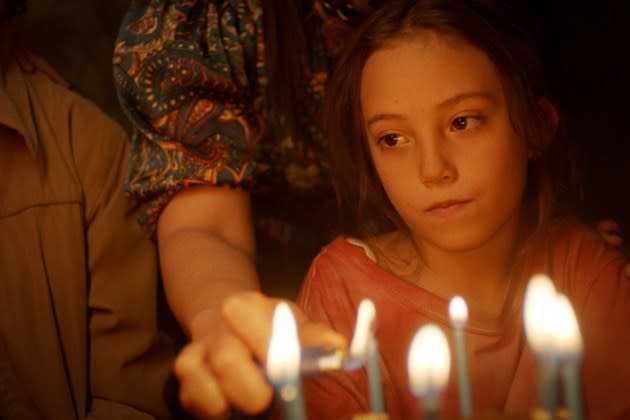‘Tótem’ Is a Mexican-Cinema Masterpiece

Tótem, Mexico’s submission for this year’s Oscars, drops a bomb on you before the opening credits have even rolled. A mother, Lucia (Iazua Larios) and her daughter, Sol (Naíma Sentíes, luminescent), are goofing around in a public restroom. The seven-year-old girl is sitting on a toilet, unable — or maybe she’s simply refusing — to heed nature’s call. Tired of waiting for her to finish up, Mom ends up peeing in the sink, to the sound of much mutual laughter. The kid tries on a giant, curly, rainbow-colored wig. They pile into a car full of balloons. Driving into a tunnel, both of them hold their breath and make a wish. Afterward, Sol is anxious to share with Mom her silent, superstitious request to the gods. “I wish for daddy not to die,” she says.
The two are heading to a birthday party for her terminally ill father Tona (Mateo García Elizondo), one which will likely be his last. Everyone from the part-time nurse/full-time bruja (Teresita Sánchez) caring for him to Sol’s grandpa (Alberto Amador), who speaks with an electrolarynx, knows this. They can call in as many psychics to cleanse the household of “bad energy,” burn as much sage, hold as many group “quantum therapy” sessions as they want. The inevitability of his expiration remains the elephant in the room, hovering over every interaction and filling every silence.
More from Rolling Stone
Still, his extended family is going to make this shindig happen no matter what. Auntie Nuri (Bardo‘s Montserrat Marañon) is determined to bake a cake for her brother, if she can keep from burning it and drinking too much out of despair; she’s also tending to Sol’s precocious, squeaky-voiced four-year-old cousin, who’s a handful. Auntie Alejandra (Marisol Gasé) is trying to organize the preshow proceedings when she’s not dying her hair, guiding a “healer” through the hallways or nudging her own tween kids to clean up. Uncle Napo (Juan Francisco Maldonado) has brought Sol a goldfish, whom the girl names Nugget. Whispered chatter about a lack of funds for chemotherapy and arguments over what’s going to happen to Tona’s paintings — he’s an artist — fill the space in between the usual familial banter. As for Sol, she just wants to spend time with her dad. She doesn’t care if he’s weak. The youngster is trying to soak up every bit of time with him that she can get.
Tótem is one of those films about death that overflows with life, and it’s a testament to filmmaker Lila Avilés that this gentle drama never collapses under its own weight or lets sorrow fully take the wheel. Her debut, The Chambermaid (2018), let viewers walk many miles in the worn-down shoes of a luxury hotel employee who cleaned rooms for the rich, and balanced class commentary with a sense of curiosity and humanity. Yet this sophomore effort by the writer-director feels like a massive leveling up, balancing an ensemble cast and weaving in and out of scenes characterized by organizational cacophony and chaos.
As with movies centered around weddings and funerals, the birthday party provides a center of gravity around which everything revolves. When Tona finally emerges from his sick room to greet the assembled friends, old flames, relatives and well-wishers, there’s a sense of joy and celebration even as everyone acknowledges this party doubles as a farewell. Avilés gets that mourning and sadness are on the horizon. She wants to give this family and this man facing his own mortality a last hurrah worthy of a life cut too short.
Yet it’s Sol’s perspective that Tótem keeps returning to, idling near the girl as she eavesdrops on conversations and clocks the variety of animals and insects that seem to outnumber the human residents of this house. (The use of nature in all of its forms to suggest a bustling world surrounding a person shuffling off this mortal coil is one of the beautiful, breathtaking choices Avilés makes in a movie filled to the brim with them.) It’s not a surprise that we build to a long close-up of her face, taking things in and recording a moment of collective jubilation before a coda punctures the spell. We’ve been watching a coming-of-age movie throughout the running time of Avilés’ delicate, fable-like tale of love and grief; it just happens to be obscured at times by such a good deal of business and bodies in motion that you can forget whose story it is. The reminder hits you like a sledgehammer. But this opportunity to observe one last remembrance of a brother, a son, an uncle, a husband, a friend and, most certainly, a father is never somber. If anything, it’s the sort of film that leaves you emotional yet also euphoric. Masterpieces, after all, have a habit of doing that.
Best of Rolling Stone
